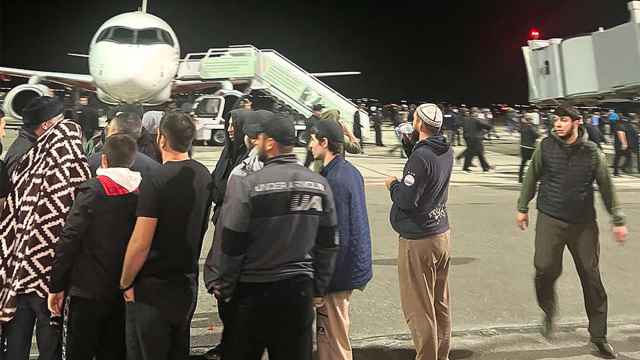BOSTON — In the city where the American revolution began in the 1770s and the east coast dot-com revolution was launched more than 200 years later, four teams of young Russian entrepreneurs are working to revolutionize the way the world sees high-tech companies from Russia as they take part in a prestigious competition for startups.
The teams, consisting of two Russians each, were among 128 new business entrepreneurs from around the world selected for this year's MassChallenge, "the largest accelerator competition in the world," said Scott Bailey, MassChallenge's director of partnerships.
Over the next four months, the Russians will meet with mentors, make business connections, try to raise funds, polish up their business plans, and possibly win one of four top prizes of $100,000.
The 361 startups that have competed in MassChallenge in its four years of existence have raised more than $362 million in capital and created nearly 3,000 jobs around the world.
The Russian Venture Company, or RVC, helped to sponsor the challenge from its first year, 2010, and this year, its US branch, RVC-USA, made a big push to boost Russian interest in the MassChallenge. The result was applications for the challenge from nearly 60 teams from Russia — up sixfold from 2010 and 50 percent more than last year.
"In 2010, less than 10 Russian companies applied to participate in the MassChallenge," RVC-USA chief executive Axel Tillmann said. "Last year, there were 36 Russian applicants, out of which three competed, and this year there were 54 applicants and there are four teams sitting in the accelerator. I think there were another 15 from Russia who were good enough to be here, but they were probably let down by their pitch," he said.
Everything, from the application to be part of the challenge to the 100-word elevator pitch and a longer, more developed pitch that MassChallenge hopefuls have to make, is done in English.
In addition to the language obstacle, Russian contestants also had to overcome visa delays, navigate the complex and costly housing market in Boston to find somewhere to live for four months, and learn skills that are highly prized in the United States but not so much so back home.
"In Russia, the focus is on the technical and sales sides of starting a new business, and here, we have learned that we have to clarify our mission, our goals, which means we first have to answer the question why we're doing this business," said Vagan Matirosyan, founder and CEO of Dressformer, one of the Russian start-ups.
"We didn't realize this in Russia; MassChallenge helped us to realize it," he said after just one week of the accelerator competition.
Dressformer, which has developed a 3-D app that allows people to try on shoes and clothing virtually, and already has clients in Russia and Europe, also felt it needed "to gain exposure in the US market, which is probably 10 times bigger than the Russian market and has lots of clothing manufacturers," Matirosyan said.
Ksenia Kopylova, 26, and Timofei Malygin, 29, the co-founders of SputnikBot, an educational game that teaches children computer programming, sat in the glass-fronted building overlooking Boston Harbor, soaking up the vast stores of knowledge at the MassChallenge.
"The opportunities here are huge. The people, not just the mentors, everyone has so much useful information," Kopylova said.
During the one-week boot camp held for competitors the first week of July, several successful U.S. entrepreneurs talked to the MassChallenge participants, including Jeff Taylor of career website Monster.com, who advised them to aim big.
Andrei Mima, founder of Qbaka, which has developed an app that alerts web developers when an error has occurred on their sites and allows them to fix it without disrupting the user-experience, was waiting for his business partner to arrive in Boston. He had been held up by visa problems. Qbaka has already won an award in the United States this year — for top innovator in Javascript technology at the Developer Week conference.
Zet Universe, makers of an application that organizes information on new devices like tablets or phones, into aesthetic visual blocks using touch and gestures, is the fourth Russian team competing in the challenge.
All four are hoping to become the first Russian team to take home one of the top prizes when the winners are announced in the fall.
But the real prize at the MassChallenge is the experience and the connections that participants make, not the money, said Bailey. The Russians were chosen for their ideas, he said, and because they could serve as a bridge to give American companies a foothold in Russia's vast, relatively unexploited market.
"We want really big thinkers who want to help solve big problems, and Russia is a great place for that — filled with engineering talent, money, and huge populations of customers," said Bailey.
A Message from The Moscow Times:
Dear readers,
We are facing unprecedented challenges. Russia's Prosecutor General's Office has designated The Moscow Times as an "undesirable" organization, criminalizing our work and putting our staff at risk of prosecution. This follows our earlier unjust labeling as a "foreign agent."
These actions are direct attempts to silence independent journalism in Russia. The authorities claim our work "discredits the decisions of the Russian leadership." We see things differently: we strive to provide accurate, unbiased reporting on Russia.
We, the journalists of The Moscow Times, refuse to be silenced. But to continue our work, we need your help.
Your support, no matter how small, makes a world of difference. If you can, please support us monthly starting from just $2. It's quick to set up, and every contribution makes a significant impact.
By supporting The Moscow Times, you're defending open, independent journalism in the face of repression. Thank you for standing with us.
Remind me later.





